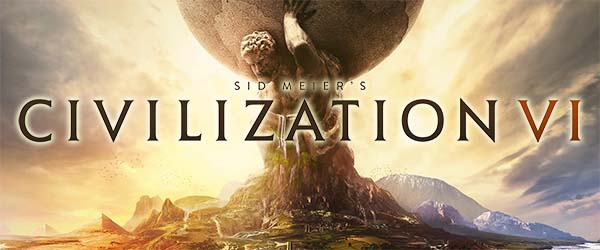
Civilization VI may look very similar to Civilization V at a glance, but once you start playing it, you're going to notice a lot of subtle differences. One of the most immediate differences will be the changes to unit-movement rules with respect to terrain. Units still travel on hexes, and terrain such as hills and forests still slow down movement, just as in the previous game. But this time around, the cost to enter a tile must be paid before entering that tile! This is a small, but significant change of rules that may force you to change the way that you explore the map.
The rewards of exploration are many, and finding these rewards is key to a good start.
Efficient exploration is key to getting off to a good start in Civilization. And a good start is key to success at higher difficulties and in competitive multiplayer. This is still true in Civilization VI. First and foremost, exploration will reveal valuable real estate for settling your first few cities, including resources, coast lines, and natural wonders. An efficient explorer will also be likely to uncover more tribal villages (i.e. "goody huts"), which will grant tech boosts, extra money, free units, or a head start towards founding your own pantheon. Efficient exploring will also introduce you to more city states, and you'll be more likely to be the first player to meet the city state. Being first to meet a city state will grant you a free envoy. This will grant you an immediate bonus depending on the type of city state, and it will put you one step closer to unlocking additional bonuses and becoming the suzerain of that city state.
So now that we've seen the rewards and benefits that await our exploration of the map, let's take a look at those new movement rules and how they'll impact our early exploration... [More]
34003f4c-d37b-4dae-b69d-b6175f32dc49|1|5.0
Tags:Sid Meier's Civilization, Civilization VI, unit, movement, hex, exploration, hill, forest, jungle, river, terrain, scout, warrior, city, city state, suzerain, natural wonder, ancient ruin, eureka, barbarian, encampment, pillage
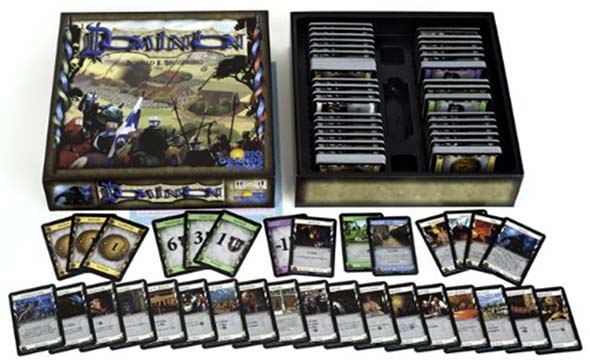
Dominion is a short and simple deck-building card game.
Most of the board games that I like are very long, epic games that take hours to play. Games like Civilization, Battlestar Galactica, and Eclipse can take four or five hours to complete - all of which can still be finished before I'm even done setting up Axis & Allies 1940!. But sometimes, my friends and I don't have hours to burn on a board game, and we need something shorter to play. Fortunately, I have a handful of shorter games as well. And one of the best and shortest games that I play is the deck-building game Dominion.
Dominion is an exceedingly simple game to learn, set up, and play. The basic concept is that each player spends money from his hand to buy kingdom cards to place in your deck. Each kingdom card has special abilities that you can execute when you play it from your hand, and the strategy of the game comes from which cards you buy and how you chain their effects together to maximize your ability to buy victory point cards. Each game will have a group of treasure cards and victory point cards, some of which are distributed to each player to form their starting hands. Each player receives seven "Copper" treasures and three "Estate" victory cards. Shuffle them, and draw five for your starting hand.
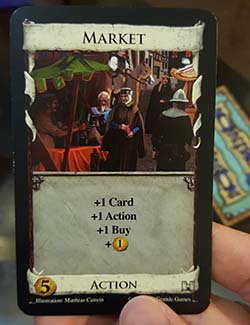
To play the game, simply follow the
directions printed on each card.
When your turn comes along, you can have an Action Phase and a Buy Phase. During the Action Phase, you play any "Action" cards from your hand and resolve their effects. During the Buy Phase, you play any treasure cards in your hand to purchase new cards to add to your deck. Each card has a cost to buy it, which is printed in the bottom corner. Certain cards will grant you additional actions or buys (i.e. the ability to split your treasure to purchase multiple cards of smaller value), and chaining them together efficiently is the key to victory.
There's very few actual rules to learn, since all the actions in the game are resolved by simply reading the effects from the card. The only things you have to learn are some of the game's basic vocabulary (e.g. "action", "buy", "gain", "discard", "trash", "attack", and so on). Once you know what all those words mean in relation to the game (and most of them are self-explanatory), you are ready to play! The result is a simple and elegant game that can be picked-up and played within a matter of minutes.
But this simple game also hides some serious depth and versatility... [More]
e3fc1c69-8f70-4575-a4de-76f7f3fa93a5|0|.0
Tags:Dominion, Rio Grande Games, board game, card game, deck-building game, medieval, renaissance, kingdom, victory point, treasure, shuffle, card protectors, Donald X. Vaccarino
Back in April, I expressed my dissapproval of the Raiders plan to relocate to Las Vegas. At the time, my primary objection was to the idea of building an NFL-size stadium adjacent to UNLV's campus. But as time has moved on, the plans have shifted, and the city has come up with new location proposals for the $1.9 billion stadium, as well as new financing plans. Last week, the Nevada State Legislature, on the order of Governor Brian Sandovall, convened a special session to vote on the proposed stadium financing plan. The successful vote was a win for the Raiders' plan to relocate, but was a major loss for the city of Las Vegas and state of Nevada.
Here is a video of the proposed stadium, which appears to be located near Russel Rd, west of the I-15.
The finance plan requires the city of Las Vegas to raise $750 million in funds from a hike in room taxes for its hotels. This leaves taxpayers supposedly off the hook by passing the bill onto tourists. Critics have complained that this takes money away from Las Vegas schools and other public infrastructure and services, but this criticism is a bit of a red herring, as there were no plans to collect such revenues and spend them on schools or other services to begin with. Critics are valid in pointing out, however, that this does take that money away from potentially being collected for the purposes of funding education or services in the future.
The city, tourists, and UNLV all get screwed
I would be fine with this $750 million price tag if the plan guaranteed some degree of revenue or profit-sharing for the city of Las Vegas. It would be an up-front investment with the potential of paying for itself over the long-term. No such fortune for us Vegas residents. This is a bum deal for the city of Las Vegas, however, as the plan does not allow for any revenue or profit-sharing from the proceeds that the stadium may gain. So public money is being spent on the project, but no money is going back to the public. Sheldon Adelson and Mark Davis are both billionaires. If they really wanted the Raiders to move to Las Vegas, they can afford to build their own damn stadium.

Mark Davis and Sheldon Adelson are both billionaires. They can afford to build their own damn stadium.
What really sours this deal though is that it also presents some other "screw you"-s to the city of Las Vegas. The plan to build a new stadium started out as a plan to build a new stadium for UNLV's football program. But UNLV gets screwed by this deal, as they will actually have to pay approximately $250,000 per game to the stadium's owners in order to play their home games there! They'd have to pay $250,000 per game to "rent" this facility! "Public stadium", my ass! If Las Vegas is raising tax money to pay for this stadium (and we're paying for almost half of the entire bill), then it should belong to the City of Las Vegas or Clark County. If it belonged to Las Vegas, then our public university (UNLV) should be able to use the facility, and should get revenue from ticket sales. Not so, apparently. Make no mistake, this is not Las Vegas' stadium; this is Mark Davis and Sheldon Adelson's stadium.
We don't get the stadium; we only get the debt. NFL teams have a long, sad history of screwing cities with stadium deals... [More]
50d0d1d9-8098-4e16-8f09-576e3c3d6007|2|5.0
Tags:Raiders, Okland Raiders, Las Vegas Raiders, Las Vegas, Nevada, Clark County, University of Nevada Las Vegas, UNLV, stadium, NFL, football, Mark Davis, Sheldon Adelson, taxes, hotel room tax, subsidy, St. Louis, Edward Jones Dome, scam
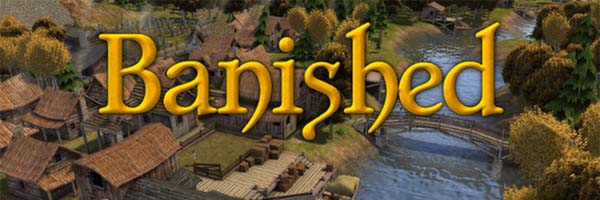
In between games of Madden 17, I need something to tide me over until the release of Civilization VI consumes my life at the end of October. As such, I did what I usually do in these situations, and I dove into my Steam backlog to look for something that's been sitting around, unplayed, for a couple years. Usually, I try to find some short games like This War of Mine or Papers, Please. I try to avoid the bigger games because they can end up consuming more of my time than I want them to, and if I jump to something else, then I may not go back to such a game to give it a fair chance. Sorry, Master of Orion, Endless Legend, and Endless Space 2, you'll all have to wait until after my upcoming Civ VI bender before I can give any of you a fair chance. That being said, I decided to take a risk and try out a city-builder that I've had sitting around for awhile. I love city-builders, and so this could easily have dragged on for weeks or months, but I hoped that the narrow scope of this game would mean that it wouldn't take as long to get my fill of it.
Banished is a game that offers unforgiving tough love. I feel like this game is the "Oregon Trail" of city-builders, and it's enjoyable as a challenging game of resource management. Unfortunately, it isn't exactly the best at explaining itself, and so it requires a lot of trial and error in order to get going. There's a lot of cycles of cascading success or failure, so you'll likely be restarting your games multiple times before you get anything remotely close to a sizable village. I would also advise that you try to keep multiple save states for your early cities so that if you make a small mistake that starts to spiral into catastrophe, you can reload and fix it without having to restart the entire game.
The tutorial explains a lot of the basic functionality of the buildings, but it never really addresses how to get the most out of these buildings. This results in an unnecessarily high learning curve and bar of entry as you try to stumble upon the optimal placements and uses of buildings. I kept making little mistakes that had big repercussions that forced me into restarting my very first game multiple times - even going so far as to save the random map seed so that I could restart in the same map and try different approaches to some things.
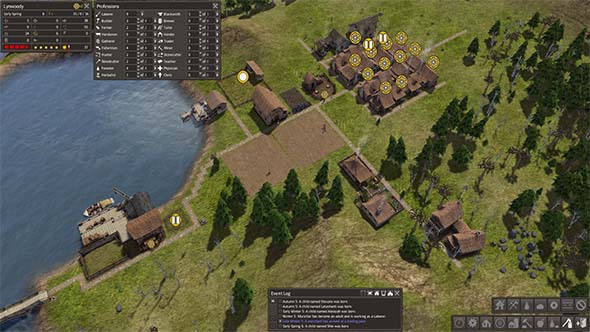
I had to iterate through some sub-optimal building placements before stumbling upon a viable city.
An example of a small misstep that crippled a game was that I built a farm that overlapped slightly with a single tree in one corner. Normally, farms are created as soon as you finish zoning them, and you simply have to select which crop to plant and assign workers to work it. But if there are any rocks or trees, then you must first remove them in order for the farm field to be built (like with any other building). So while I waited for some laborers to come chop down the trees (uncertain why nobody was bothering to cut down that one fracking tree!) spring passed and the window for planting closed. So the farm went un-used for the rest of the year, I had no crops saved up, and several adults and children died, leaving my village under-staffed for the following year. So I restarted and placed my farm entirely in an open field, planted during the first spring, and collected a healthy reserve of wheat to keep all my villagers fed through the winter... [More]
f4887e6d-007a-43fa-9a02-db5781c5c44b|1|5.0
Tags:Banished, Shining Rock Software, Steam, indie gaming, city simulation, simulation, strategy, survival, medieval, renaissance, agriculture, farming, resource management, food, minerals, roads, seasons, winter, Oregon Trail

Perhaps I just have a bias against parallel dimensions (as evidenced from my interpretation of Silent Hill's otherworld), but I want to take some time to clear up what might be a mis-conception in the conventional wisdom interpretation behind Dark Souls' multiplayer summoning mechanics. Dark Souls co-op is not necessarily based on parallel dimensions, as many players seem to assume. It might, in fact, be intended to be an abstraction of some kind of time travel. I've noticed that many players online already seem to refer to the multiplayer mechanic of these games in terms of time travel, but I've yet to see any wikis, lore videos, or blogs that seem to explain multiplayer as a time travel mechanic.
I want to preface this analysis by stating that I'm not asserting that the following explanation is the absolute, 100% correct interpretation of the mechanic. Individual players may disagree based on their own reading of the game, and I'm personally somewhat conflicted on the topic myself. I merely want to propose this as a possible alternative to the defacto "parallel worlds" interpretation. I'm going to point out in-game evidence that supports the idea that Dark Souls' multiplayer is based on time travel, but there is also in-game evidence and mechanical evidence that flat-out contradicts that interpretation. I will address those contradictions as well. So that being said, please keep an open mind, and enjoy the read!
The summoning mechanic
There are two games in the series that are not part of the Dark Souls franchise, and which have different in-game explanations and rules for the same multiplayer features (more or less). Those games are, of course, Demon's Souls and Bloodborne. Both have asynchronous multiplayer and summoning mechanics that work similarly to Dark Souls.
Demon's Souls summoning operates under the idea of summoning the spirit of a fellow adventurer who's soul is trapped in the Nexus. This is why you must be in soul form in order to be summoned. Bloodborne's beckoning operates [similarly] under the principle of manifesting hunters out of dreams (which seems to operate under a similar cyclical paradigm to Dark Souls, but I'm not 100% sure). In Dark Souls, you aren't necessarily summoning ghosts (as you do in Demon's Souls), since the undead in Dark Souls are more akin to zombies than ghosts. Also, characters in Dark Souls can leave summon signs whether they are hollowed (dead) or in human form (revived), which is a significant alteration from Demon's Souls. A lore reason for summoning is provided in Dark Souls:
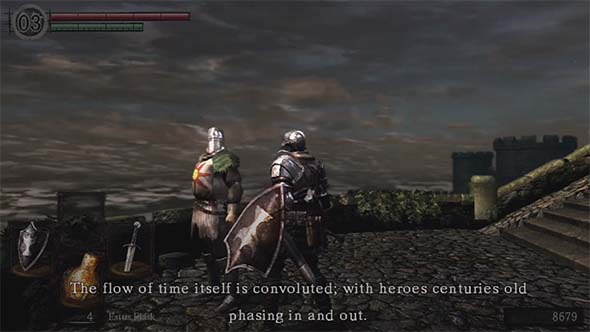
Solaire explains to us how summoning works:
"We are amidst strange beings, in a strange land.
The flow of time itself is convoluted; with heroes centuries old phasing in and out.
The very fabric wavers, and relations shift and obscure.
There's no telling how much longer your world and mine will remain in contact.
But, use this, to summon one another as spirits, cross the gaps between worlds, and engage in jolly co-operation!"
Both Solaire's dialogue, and the White Sign Soapstone (along with other online play items) make references to other "worlds", which leads to many jumping to the conclusion that each player's game is a sort of parallel universe within the Dark Souls lore. However, this may not necessarily be correct. Both Solaire's dialogue and the soapstone also provide explanations for these worlds: "time is convoluted | distorted". This seems to be the explanation for what is meant by "worlds", and it seems that Solaire and the in-game descriptions may be using "time" and "world" interchangeably (could it be a translation / localization issue?). The phrasing in the white soapstone's description joins "the flow of time is distorted", and "the White Soapstone allows undead to assist one another", into a single, compound sentence, which definitely implies that the two phrases (and ideas) are linked.

"Online play item. Leave summon sign.
Be summoned to another world as a phantom through your sign, and defeat the area boss to acquire humanity.
In Lordran, the flow of time is distorted, and the White Sign Soapstone allows Undead to assist one another"
The dialogue of Saulden (the Crestfallen Warrior of Dark Souls II) is even more explicit... [More]
b4b5ccdc-fe67-4add-901b-a41077204778|4|5.0
Tags:Dark Souls, Dark Souls II, Dark Souls III, lore, summon, phantom, multiplayer, From Software, time travel, paradox, grandfather paradox, predestination paradox, parallel dimension, soapstone, Solaire, Crestfallen
Warrior, Crestfallen Saulden, Lautrec, Ringfinger Leonard, Anri of Astora, Sirris of the Sunless Realms, Black Iron Tarkus, Iron Golem, Anor Londo, invasion, Demon's Souls, Bloodborne
|

| 12 | | | | | | | 60 | | 11 | | | | | | | 55 | | 10 | | | | | | | 50 | | 09 | | | | | | | 45 | | 08 | | | | | | | 40 | | 07 | | | | | | | 35 | | 06 | | | | | | | 30 | | 05 | | | | | | | 25 | | 04 | | | | | | | 20 | | 03 | | | | | | | 15 | | 02 | | | | | | | 10 | | 01 | | | | | | | 05 |
|